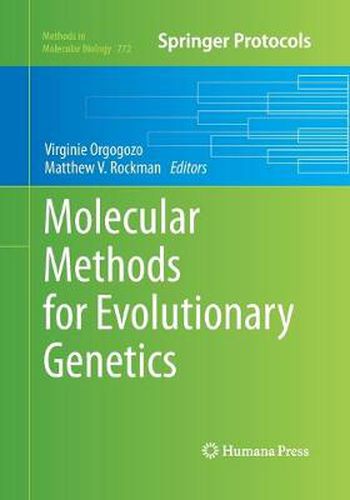Readings Newsletter
Become a Readings Member to make your shopping experience even easier.
Sign in or sign up for free!
You’re not far away from qualifying for FREE standard shipping within Australia
You’ve qualified for FREE standard shipping within Australia
The cart is loading…






This title is printed to order. This book may have been self-published. If so, we cannot guarantee the quality of the content. In the main most books will have gone through the editing process however some may not. We therefore suggest that you be aware of this before ordering this book. If in doubt check either the author or publisher’s details as we are unable to accept any returns unless they are faulty. Please contact us if you have any questions.
We are entering a particularly fruitful period in evolutionary genetics, as rapid technological progress transforms the investigation of genetic variation within and between species. Molecular Methods for Evolutionary Genetics is a collection of advanced molecular biology protocols and general overviews intended to represent the essential methods currently bringing evolutionary genetics to fruition. Divided into six thematic sections, this volume covers methods for characterizing genomes, diverse approaches to enrich DNA for subsets of the genome prior to sequencing, and state-of-the-art protocols for sampling genetic variation for genetic mapping studies and population genetic studies (RAD sequencing, Sequenom, microarrays, etc.). The volume concludes by focusing on methods to study candidate genes, from obtaining their sequences and analyzing their transcripts to experimentally manipulating their activities in vivo. Written in the highly successful Methods in Molecular Biology ™ series format, chapters contain introductions to their respective topics, lists of the necessary materials and reagents, step-by-step, readily reproducible laboratory protocols, and notes on troubleshooting and avoiding known pitfalls.
Authoritative and accessible, Molecular Methods for Evolutionary Genetics serves as a rich resource to biologists interested in evolution, whether they be specialists or beginners in molecular biology.
$9.00 standard shipping within Australia
FREE standard shipping within Australia for orders over $100.00
Express & International shipping calculated at checkout
This title is printed to order. This book may have been self-published. If so, we cannot guarantee the quality of the content. In the main most books will have gone through the editing process however some may not. We therefore suggest that you be aware of this before ordering this book. If in doubt check either the author or publisher’s details as we are unable to accept any returns unless they are faulty. Please contact us if you have any questions.
We are entering a particularly fruitful period in evolutionary genetics, as rapid technological progress transforms the investigation of genetic variation within and between species. Molecular Methods for Evolutionary Genetics is a collection of advanced molecular biology protocols and general overviews intended to represent the essential methods currently bringing evolutionary genetics to fruition. Divided into six thematic sections, this volume covers methods for characterizing genomes, diverse approaches to enrich DNA for subsets of the genome prior to sequencing, and state-of-the-art protocols for sampling genetic variation for genetic mapping studies and population genetic studies (RAD sequencing, Sequenom, microarrays, etc.). The volume concludes by focusing on methods to study candidate genes, from obtaining their sequences and analyzing their transcripts to experimentally manipulating their activities in vivo. Written in the highly successful Methods in Molecular Biology ™ series format, chapters contain introductions to their respective topics, lists of the necessary materials and reagents, step-by-step, readily reproducible laboratory protocols, and notes on troubleshooting and avoiding known pitfalls.
Authoritative and accessible, Molecular Methods for Evolutionary Genetics serves as a rich resource to biologists interested in evolution, whether they be specialists or beginners in molecular biology.